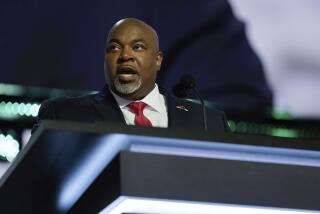Marriage amendment vote puts national focus on North Carolina
- Share via
PITTSBORO, N.C. — With voting already underway for Tuesday’s primary in this moderate Southern state, the discourse has been dominated not by candidates, but by a bitterly contested measure known as Amendment 1.
If approved, it would be among the most restrictive of the marriage amendments passed in 30 states. It would amend the state’s constitution to specify: “Marriage between one man and one woman is the only domestic legal union that shall be valid or recognized in this state.”
The battle over the measure has turned North Carolina into a national political flash point. Opponents say the amendment is so broadly worded that it would discriminate not only against gays, but also unmarried heterosexual couples.
The outcome could offer an early hint of the state’s leanings in November’s presidential election: North Carolina, home to the 2012 Democratic National Convention, is an important swing state.
The debate has been fierce. Pro- and anti-amendment activists have held rallies to vie for voters. Ministers have strived to influence their congregants. Lawn signs have been stolen and defaced. And the state NAACP has accused proponents of trying to divide gays and blacks.
Opponents of the amendment have raised $2.2 million, and proponents $1.2 million, mostly for TV and radio ads; a third of the money has come from out of state.
The Rev. Billy Graham has weighed in, preparing a full-page ad expected to appear in newspapers over the weekend. In it, he urges fellow Tar Heels to vote for the amendment, saying: “At 93, I never thought we would have to debate the definition of marriage.”
President Obama has called the Republican-backed Defense of Marriage Amendment divisive, saying it would discriminate against gays.
“It’s a hot issue — you hear people talking about it everywhere,” said amendment supporter Ray McEntee. He was manning a booth outside a Pittsboro polling place next to a sign that read: “One Man. One Woman.”
Early voting started April 19, with turnout running about 30% higher than in the primary four years ago and with especially large numbers of young people voting.
“It’s almost entirely driven by interest in the amendment,” said David McLennan, a political science professor at William Peace University in Raleigh. He predicts turnout will reach 40% to 45%, unusually high for a primary.
Like amendments in Michigan, Idaho and South Carolina, North Carolina’s act would severely limit protections for same-sex and heterosexual unmarried couples, said Maxine Eichner, a family law professor at the University of North Carolina in Chapel Hill.
The measure would threaten domestic partnership health benefits for local government workers and strip unmarried couples of their rights to make decisions for an incapacitated partner, Eichner said.
Supporters of Amendment 1 say unmarried couples would be protected by language that permits private contracts and court actions “pursuant to such contracts.”
**
In North Carolina, the issue does not always break along party lines. The National Assn. for the Advancement of Colored People opposes the amendment, but numerous black churches support it, as do many other churches and some conservative Democrats. The state’s Libertarian Party opposes the amendment, along with the head of the conservative John Locke Foundation.
More than 75 chief executives have signed a letter against the amendment. Jim Rogers, chief executive of Duke Energy, told a business forum last month: “If this passes, we’re going to look back 20 years from now, or 10 years, and think of it like Jim Crow laws.... You’re sending a message to the world that we’re not inclusive.”
North Carolinians have long considered their state the most progressive in the South. Opposition to the amendment is centered in urban enclaves, such as the Raleigh, Durham and Chapel Hill area, where support for gay rights is strong.
But wide swaths in the state’s east and west are dominated by small towns and rural communities, where conservative Christian values predominate. Those areas vote solidly Republican on social issues such as gun control, abortion and same-sex marriage.
Democrats pushed to have the vote in the May primary instead of the November general election because they feared that a November vote would attract more conservatives, boosting the Republican presidential candidate. The website for Protect All NC Families, which opposes the amendment, says: “A ‘For’ vote will eliminate healthcare, prescription drug coverage and other benefits for public employees and children receiving domestic partner benefits [and] threaten protections for all unmarried couples in North Carolina.”
Eleven family law professors from universities across the state issued a statement endorsing those conclusions, as did the presidents of the state psychological and psychiatric associations. Several cities, including Raleigh, Durham, Greensboro and Asheville, have passed anti-amendment resolutions.
The website for Vote For Marriage NC, which supports the amendment, says that, if traditional marriage is not protected, “we will have an inevitable increase in children born out of wedlock, an increase in fatherlessness, a resulting increase in female and child poverty.”
Amid competing rhetoric, the North Carolina secretary of state’s Constitutional Amendments Publication Commission says there is “debate among legal experts” over how the amendment would affect employment-related benefits, child custody and visitation and domestic violence laws.
“The courts will ultimately make those decisions,” the commission said in a statement.
**
A 1996 state law already defines marriage as between a man and a woman. But proponents say a constitutional amendment is necessary to prevent “activist judges or politicians” from overturning the law.
The amendment has been debated, among other places, in side-by-side booths outside a voting site near Pittsboro on Tuesday. McEntee said traditional marriage must be protected from political and judicial efforts to dilute it.
“Marriage is a sacrament. It’s fundamental, and it needs protection,” McEntee said.
A few feet away, opponents of the measure gathered under the shade of a tree in brilliant spring sunshine, urging voters to defeat the amendment.
“We have no business writing discrimination into the North Carolina constitution,” said Karl Kachergis, a local resident and former chairman of the county Democratic Party.
Meanwhile, the Republican House speaker, Thom Tillis, who supports the amendment, acknowledged the state’s increasingly liberal leanings. Addressing students at NC State University in March, he said their generation would one day overturn the amendment.
“If it passes, I think it will be repealed within 20 years,” Tillis said.
More to Read
Sign up for Essential California
The most important California stories and recommendations in your inbox every morning.
You may occasionally receive promotional content from the Los Angeles Times.











